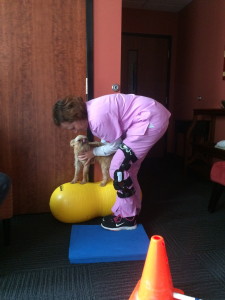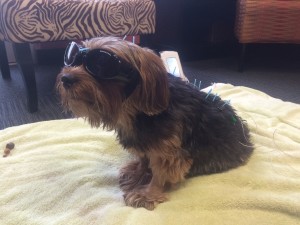When treating your pets, Newtown Vet is constantly working to offer the most complete, effective solutions to help them reach the highest level of health possible. Because of this, we’ve expanded our treatment options to include rehabilitation therapies.
Animal rehabilitation is an excellent complement to traditional medicine because it continues the healing process after the surgery is over or the medicine has run its course. It may be used to treat acute injuries, surgical recovery, or existing conditions including pain, poor fitness, and age related illness.
After an injury or surgery, the body may continue to involuntarily protect the weakened area, which can lead to decreased mobility and functionality. Although traditional veterinary care, and perhaps surgery, is sometimes still required, certain injuries or conditions may be treated solely through rehabilitation.
Conditions that might be improved with rehabilitation include:

- Overweightness and weight-related issues
- Osteoarthritis
- Hip dysplasia
- Spinal conditions – weakness, spasticity, spinal injury, or dysfunction.
- Muscle, tendon, and ligament injuries
- Joint pain – may be caused by age, injury, illness, or poor fitness.
- Neuromuscular diseases
- Nerve damage
- Neurological impairments
- Post-surgery recovery
Animal rehabilitation techniques, paired with traditional veterinary medicine, will help your pet achieve or return to top condition faster and more fully:
- Joint mobilization – promotes full range of motion.
- Soft tissue mobilization and massage – relieves pain and stiffness and increases mobility.
- Therapeutic exercise – improves fitness and strength while managing pain or dysfunction.
- Acupuncture – pain management.
- Chiropractic – corrects alignment, relieves strained muscles, and promotes healthy spinal function.
- Therapeutic laser – relieves pain and spams by increasing blood flow to a certain area.
- Neuromuscular electrical stimulation – reduces swelling and pain while fighting atrophy.
- Cold and hot therapies – reduces pain, relaxes muscles, and constricts and encourages blood flow, respectively.
- Cathy P.
 Treatment Plans
Treatment Plans
If animal rehabilitation is a good course for your pet, your veterinarian can refer you to Newtown Vet’s rehabilitation team. After an initial consultation with our rehab veterinarian, we will develop a customized treatment plan created just for your pet. This will include realistic goals based on your pet’s age, breed, and medical history and a therapy regime to help you and your pet achieve those goals together.
Like any type of pet care, results depend entirely on the owner’s commitment to treatment and the natural capabilities of the animal. Rehab therapy can be time consuming, but every minute is progress. It’s important to be realistic about what your pet can achieve given his physical limitations, age, and breed, but regular therapy sessions, both at our hospital and at home, will produce steady improvement in your pet’s mobility and overall health.
https://vimeo.com/199956814
